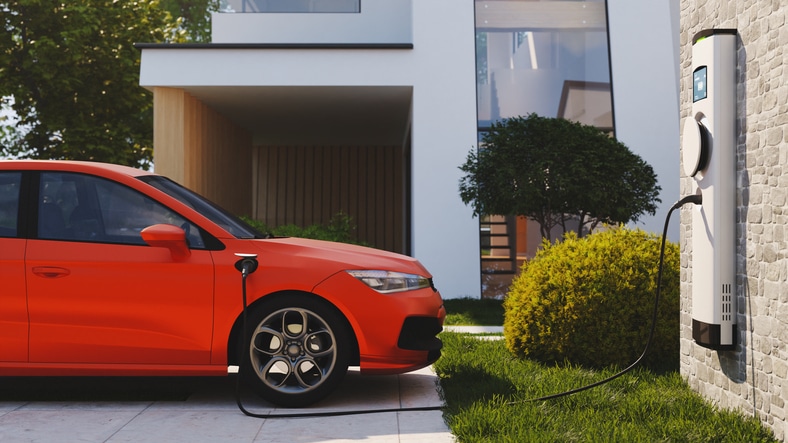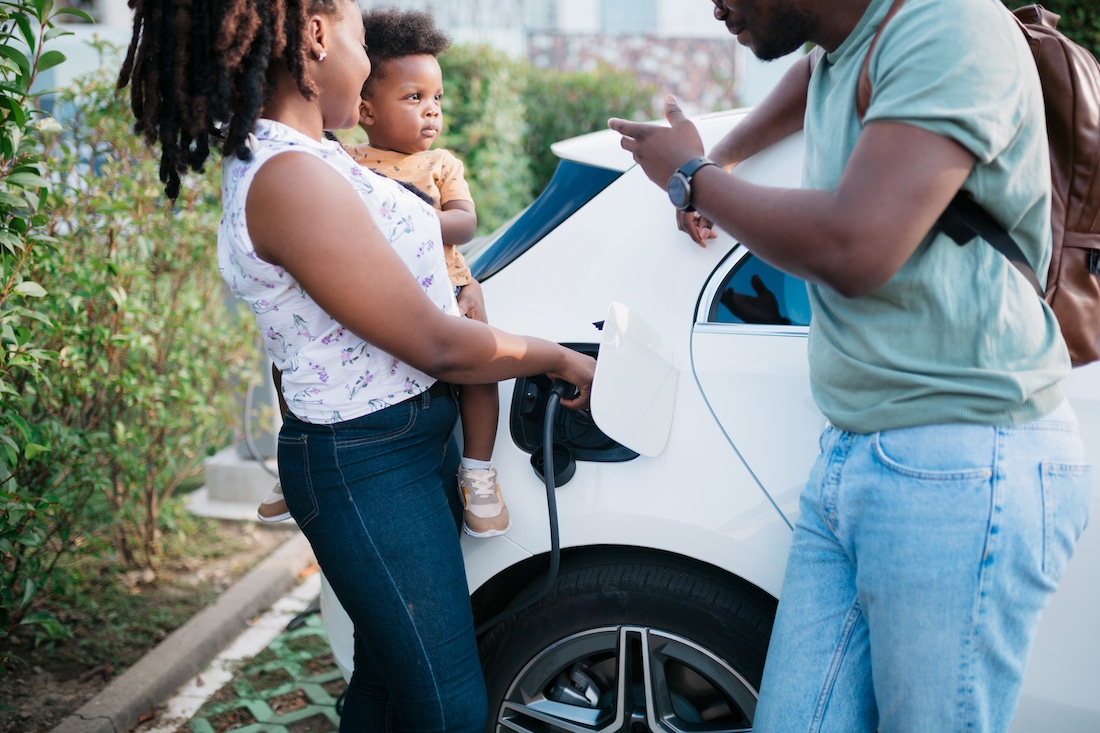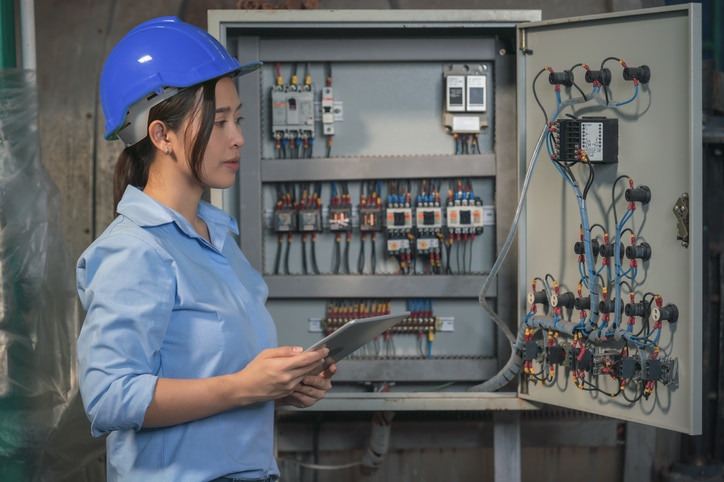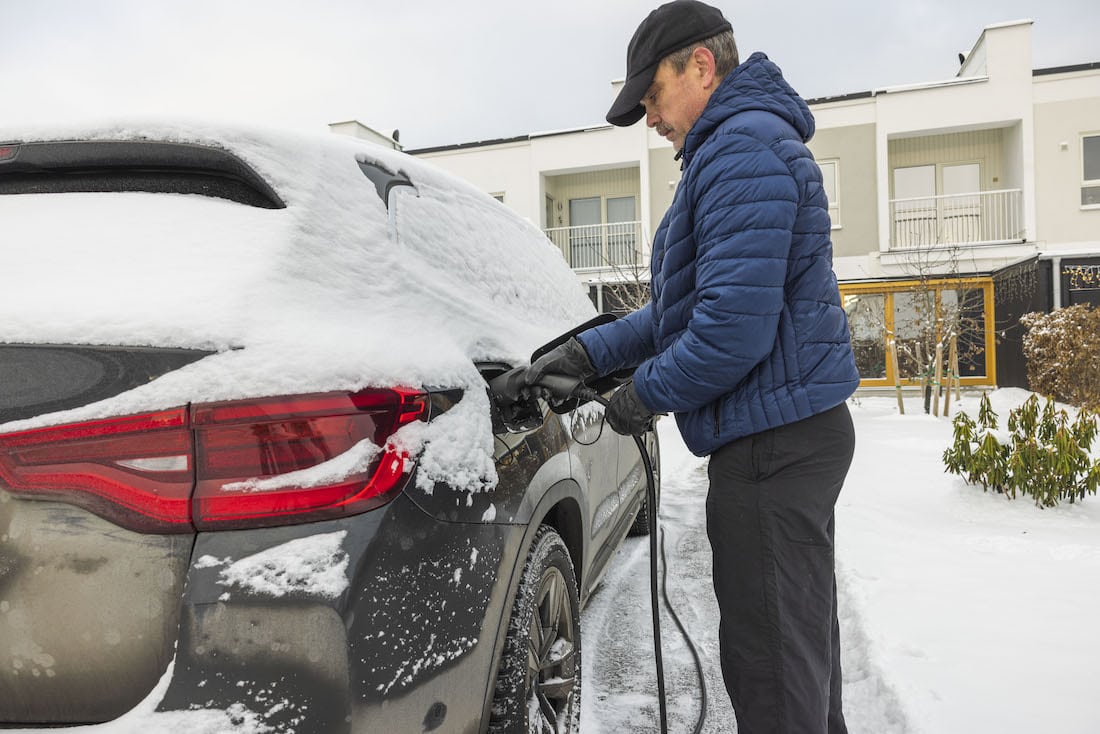Electric Vehicle Chargers
If you purchase an EV you are most likely planning on charging it at home, and if you don’t live in a condo or apartment complex with public chargers you have a few options to consider when it comes to home charging.
What Kinds of Chargers Are There?
When it comes to charging your electric vehicle at home, there are a few options to consider. From standard 120-volt outlets to high-powered Level 2 chargers, and even the super speed Level 3 chargers, let’s explore the different home charger options available to suit your needs.
Level 1 Home Chargers
Level one charging is going to be the most simple and accessible, and it while that it is benefits you need to also consider some of the down sides of level one charging.
Benefits
- Universal Compatibility: One of the great things about Level 1 EV chargers is that they can be used with any electric vehicle (EV) that comes with a standard plug. So, whether you drive a Tesla, a Chevy Bolt, or a Nissan Leaf, you can use a Level 1 charger without any worries.
- Affordable and Accessible: Level 1 chargers are the most basic and affordable EV charging option available. They usually come standard with your electric vehicle purchase, eliminating the need for any additional purchases or installations. Plus, they can be plugged into a standard household 120-volt outlet, so you don’t have to worry about complicated wiring or special equipment.
- Convenience: Level 1 chargers are perfect for drivers who have a lot of time at home and don’t do a ton of long-distance driving. Since Level 1 chargers are slower than higher-level chargers, they’re ideal for overnight charging. Just plug in your car when you get home, and it’ll be fully charged and ready to go by morning.
Drawbacks
- Slow Charging: The main drawback of Level 1 chargers is their slow charging speed. They typically deliver about 4-5 miles of range per hour of charging, which can be quite time-consuming if you have a depleted battery or need a quick top-up. So, if you’re a frequent long-distance traveler or rely heavily on your EV for daily commuting, you might find the charging pace a bit frustrating.
- Limited Range: If you primarily rely on Level 1 charging, it means you won’t be able to take advantage of the faster charging speeds available at higher-level chargers. This can be a drawback if you need to quickly charge your vehicle during a road trip or want the flexibility to charge on the go.
- Not Ideal for All Situations: Level 1 charging is best suited for people who have the time and patience to let their vehicle charge overnight. If you live in an apartment or condo without access to an outlet near your parking spot, or if you’re constantly on the go and need a faster charging solution, then a Level 1 charger might not be the best fit for your lifestyle.
Remember, Level 1 chargers have their pros and cons, so it’s important to consider your specific needs and driving habits before deciding if it meets your charging requirements.
Level 2 Home Chargers
Level two charging is overall the best option for home charging solutions, but the cost can be prohibitive.
Benefits
- Speedy Charging: One of the major advantages of Level 2 chargers is their faster charging speed compared to Level 1 chargers. Level 2 chargers can deliver around 10-30 miles of range per hour of charging, depending on your vehicle and the charger's power output. This makes them a great option if you want to charge your EV quickly, especially if you're on the go or have a longer daily commute.
- Versatility: Level 2 chargers are available in various formats, such as wall-mounted units or portable chargers, providing flexibility in terms of installation and mobility. They require a 240-volt power supply, which typically means getting a dedicated circuit installed by a professional electrician. However, once it's set up, you can enjoy the convenience of faster charging wherever you have access to a Level 2 charger.
- Compatibility with Smart Features: Many Level 2 chargers come equipped with smart features like Wi-Fi connectivity, mobile apps, and smart grid integration. These features allow you to monitor and control your charging remotely, schedule charging during off-peak hours for cost savings, and even receive alerts and updates on your charging status. It adds a layer of convenience and control to your EV charging experience.

Drawbacks
- Installation and Costs: Level 2 chargers require professional installation and a dedicated circuit, which can result in higher installation costs compared to Level 1 chargers. You’ll need to work with an electrician to ensure that your electrical system can handle the charger’s power requirements. While the upfront costs may be higher, it’s worth considering the long-term benefits and convenience.
- Location Availability: Level 2 chargers are more commonly found in public spaces, workplaces, and homes with dedicated charging setups. While their popularity is growing, you might not have as many Level 2 charging options available when on the road or in certain areas. Before investing in a Level 2 charger, it’s essential to ensure that you have access to compatible charging stations in your typical driving environment.
- Not Ideal for Quick Top-Ups: While Level 2 chargers are faster than Level 1 chargers, they are still not as speedy as Level 3 fast chargers, also known as DC fast chargers. If you frequently need quick top-ups or want to get the maximum range in the shortest time possible, you might find Level 2 charging too slow for your needs.
Level 2 chargers offer significant advantages in terms of speed and convenience over Level 1 chargers. However, it’s important to consider installation costs, availability in your area, and your typical charging requirements before deciding if a Level 2 charger is the right fit for you.
Level 3 Home Chargers
Considering the high costs, compatibility limitations, and potential infrastructure challenges, Level 3 chargers are generally more suited for public charging stations, highways, or commercial locations rather than individual home use. However, if you frequently engage in long-distance travels or have specific needs that demand ultra-fast charging at home, it might be worth exploring Level 3 charging options
Choosing the right home charger for your electric vehicle can make a world of difference in terms of convenience and charging speed. Whether you opt for a simple Level 1 charger or go for a more advanced Level 2 option, charging your EV at home has never been easier.
Should I get a Hardwired or Plugin Charger?
When deciding between a hardwired EV home charger and a plug-in charger, there are a few factors to consider. A hardwired charger offers a permanent installation that is visually clean and secure with dedicated power supply, ensuring reliable charging. However, it lacks the flexibility of portability and may require professional installation, making it less convenient if you plan to move or have limited access to your electrical panel. On the other hand, a plug-in charger is portable, easy to install yourself, and generally more affordable. It offers flexibility in terms of location and can be taken with you if you move. However, it may be less visually appealing, and depending on electrical outlet availability, you'll need to manage the cable and consider potential overloading of existing circuits. Ultimately, the choice depends on your priorities, whether you value a neat installation and enhanced security (hardwired), or flexibility and cost-effectiveness (plug-in).

Should I get a Networked Charger?
Additionally, it's worth exploring whether your local power utility offers rebates or incentives for installing networked chargers. These rebates can help offset the higher cost associated with networked models. Considering the potential savings from these rebates, you can weigh the benefits and costs to determine if a networked charger is a worthwhile investment for your specific situation.

What do I need to know about installing a home charger?
Before installing a home charger for your electric vehicle, there are a few key factors to consider:
- Charging Speed and Power: Determine your charging needs based on your driving habits. Consider whether you require faster Level 2 charging or if Level 1 charging is sufficient for your daily mileage. Also, evaluate the power capacity of your electrical system and ensure it can handle the additional load of a home charger.
- Installation Location: Assess where you plan to install the charger. Consider proximity to your parking spot, accessibility to an electrical panel, and potential circuit length/requirements. If you’re in a multi-unit dwelling, you may need to consult with your landlord or homeowner’s association to ensure compliance with any regulations or permissions.
- Electrical Upgrades: If your home’s electrical system doesn’t meet the requirements for the charger installation, you may need to invest in electrical upgrades or modifications. It’s essential to consult with a licensed electrician to assess the feasibility, cost, and safety considerations.
- Permits and Inspections: Check with your local building authority to determine if any permits or inspections are required for installing a home charger. Compliance with local regulations ensures the installation is performed safely and in accordance with the necessary codes.
- Cost Considerations: Evaluate the overall cost of the charger, installation, and any potential electrical upgrades. Additionally, research available incentives, rebates, or tax credits that may be offered by your state or local utility to offset some of the expenses.
- Smart Features and Network Connectivity: Consider if you desire smart features like remote monitoring, scheduling, or integration with energy management systems. Assess if network connectivity or compatibility with specific charging networks is important to you.
By carefully considering these factors, you can better understand your charging needs, ensure a safe and appropriate installation, and be well-prepared for the costs and regulations associated with installing a home charger. Consulting with a licensed electrician or engaging with reputable charging equipment providers can help clarify any specific requirements or concerns related to your home’s unique circumstances.
What it takes to charge at home video transcript
Rebate Information
To get the most out of purchasing a home charger for your EV you may want to take advantage of the many rebates that are available. The rebates come through your power provider so you are limited on what chargers you can purchase and get a rebate for.
PGE
With the Smart Charging program, PGE offers rebates to make it more affordable for you to install a Level 2 charger at home. These chargers can charge your EV up to 5 times faster than simply plugging into a standard outlet, meaning you’ll be back on the road in no time.
By participating in the program, you’ll also earn ongoing PGE bill credits. How does it work? Well, PGE will shift your electric car charging to times when energy demand and prices are lower, and sustainable resources are more available. This way, not only will you be saving money, but you’ll also be helping the environment.
To get started, all you need to do is purchase and install a qualifying Level 2 charger. And don’t worry, if your new charger requires replacing your main breaker panel, PGE has got you covered. You can receive a rebate of up to $1,000 to help with the cost of that replacement.
Here’s what you need to do to participate
- Be the residential PGE account holder.
- Own or lease an EV or plug-in hybrid.
- Purchase and install a new qualified Level 2 charger.
And there’s even more good news for income qualified customers. You may be eligible for a rebate of up to $1,000 for the charger installation. To qualify for this rebate, your household must earn no more than 120% of the median income for your household size.


Pacific Power
The Pacific Power Rebate Program offers a great rebate options to save you money.
For hardwired Level 2 chargers, Pacific Power will provide a rebate of up to $500, covering 75% of the total costs. That’s a significant discount! If you opt for a 240-volt home EV charger, you can receive up to $250, again capped at 75% of the costs. To be eligible for these rebates, you need to be a Pacific Power residential customer and own or lease an electric vehicle or plug-in hybrid. Additionally, you’ll be automatically enrolled in their Time of Use program. Make sure to submit a rebate application within one year of purchasing your qualified charger and have all the necessary documents, such as the product receipt, installation invoice, permits (if applicable), and photos of the installed charger and electric panel.
If you meet the income-qualified criteria, Pacific Power has an even more generous rebate program for you. For hardwired Level 2 chargers, you can receive up to $1,500 without any cap on the percentage of costs paid. For 240-volt home EV charging, you can receive up to $500. To be eligible, you must be an income-qualified Pacific Power residential customer and own or lease an electric vehicle or plug-in hybrid. Similar to the standard rebate program, you need to submit a rebate application within one year of purchase, and have the necessary documents, including an Income Verification Form & Proof of Income.
To determine if you meet the income eligibility, you must have a household income below 400% of the federal poverty guideline. Check to see if you receive help from specific agencies like Oregon Energy Fund, Low Income Home Energy Assistance Program, Oregon Energy Assistance Project, American Rescue Plan Act, and COVID-19 Energy Assistance Program. If not, you’ll need to complete an income verification form and provide proof of income. The maximum household income varies based on household size, ranging from $51,520 for a household size of 1 to $196,800 for a household size of 9.
So, whether you’re eligible for the standard rebate or income-qualified rebate, Pacific Power has some great options to help reduce the cost of installing a home EV charger. Don’t miss out on these rebates – they’re a game-changer for your electric vehicle charging needs.
Clark Public Utilities
If you’re a Clark Public Utilities customer you’ll want to check out their EV Charger Rebate Program. They are offering some great rebates with many options for your to choose from
Let’s start with the Residential Level II Connected Charger Rebate. With this rebate, you can get $400 off the purchase and installation of a qualified Level II charger. That’s a pretty substantial discount! But wait, there’s more – if the purchase price of the charger is below $400, the rebate will cover the entire cost, excluding sales tax and installation. This rebate is only applicable to new EV charger purchases and you can claim up to two rebates per household. Keep in mind, though, that the charger must be Energy Star rated and “Connected” (meaning it has an internet connection or is Wi-Fi enabled). Don’t forget to check with your local jurisdiction for any electrical permit requirements
Now, if you prefer a non-connected charger or a mobile connector plugged into a 240V socket, the Residential Level II Non-Connected Charger and Mobile Connector Rebate is perfect for you. This rebate gives you $100 off the purchase and installation of any Level II charger or a mobile connector. You can claim up to two rebates per household, and there’s no need for the charger to be Energy Star certified or connected to the internet. Just make sure to double-check the electrical permit requirements with your local jurisdiction.
Chargers
PGE, Pacific Power, and Clark County Utilities all offer rebates on a pre-approved list of charges, you’ll want to take that into consideration if you are looking to get a rebate. PGE and Pacific Power have a very similar list, which we’ve outlined below, however if you use Clark County Utilities for your home electric you are in luck.
Clark County will let you pick a charger from this huge list, which means you should be able to find the perfect charger that meets your needs and nets you that rebate
Clark Public Utilities Qualified Product List
PGE Qualified Chargers
Manufacturer
Model Name
Model/Product Number
Manufacture Information
Pacific Power Qualified Chargers
Manufacturer
Model Name
Model/Product Number
Manufacture Information
Wrap Up
In conclusion, when it comes to home chargers for your electric vehicle, there are a few key factors to consider. First, you’ll need to decide between a hardwired or plug-in charger, depending on the level of convenience and flexibility you desire. Additionally, opting for a networked charger can provide added benefits such as monitoring and remote access. When it comes to installation, it’s crucial to consult with professionals who can ensure a safe and efficient setup. And don’t forget about the fantastic rebates offered by local power agencies like PGE, Pacific Power, and Clark Utilities, which can significantly offset the cost of a qualified charger. By taking these factors into account, you can enhance your electric driving experience right from the comfort of your own home.
If you have any questions about EVs, Chargers, or Rebates that you still have please feel free to reach out and contact our EV Experts at any one of our many location in the Portland, Vancouver, Sandy, and Longview Area!
